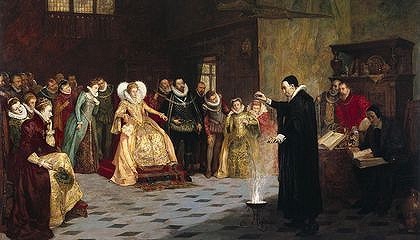AbsoluteMagic

Henry Gillard Glindoni (1042-1913): John Dee performing an experiment before Queen Elizabeth I.
"I don't quite know as little as she did … yet."
Knowing seems the most over-rated ability. Not to denigrate folks who know a lot, they're welcome to their achievements, but I speak here of what we believe we need to know. This belief seems like AbsoluteMagic. The stories I tell myself, explaining why I can't do, seem to anchor what I don't yet know, as if my lack of knowing reasonably prevented me from certain doing. In practice, this insistence rarely proves true. Most of what I've actually done seemed more fueled by desire than by knowledge, the knowing emerging after or along the way toward actually having done. Certainly, I usually struggled before achieving any desired end, but most of these complications seemed beyond knowing until the moment I encountered them then figured 'em out. No amount of preparation could have helped me avoid complications, or so I conclude.
My ability to assert what I could not possibly know serves as AbsoluteMagic. It generates self-fulfilling prophesies which leave me feeling more reassured and confident. I have refused to engage in many activities which might have proven fulfilling, but instead sat insistent and smug as any headstrong child, insisting that I didn't know. I justified my avoidances by insisting that I didn't know how, as if I did know how to determine that I wouldn't learn how somewhere in-between starting and finishing. I successfully closed off opportunities to learn by insisting that I did not know, as if knowing was a necessary precedent. How could I possibly know that?
The GrandOtter's reworking her stories. The Muse and I have been fulfilling the role of unrequested grammarian, asking just this kind of question. How could you possibly know? We're not considering untrained brain surgery, but perhaps some things more consequential than that. Her language, our language, seems to create the world we inhabit, strongly-defended limitations as well as strongly-asserted insistences. Some fictions seem more useful than others, but each story contributes to the cause. The lessons we carry away from our experiences might ensure ad infinitum repeat performances of both unwanted as well as strongly-desired experiences. I caught myself disclosing that people who hail from deeply dysfunctional families, for instance, tend to find their birth family's drama repeated again and again, at work, at school, even in new far away homes especially organized to avoid repeating those performances. I cannot recount the number of disgruntled employees I've spoken with who felt cheated when they changed jobs only to find their old job's dramas repeating within their new company.
I believe that our deepest knowings lie hidden within our muscle memory, not really cognitive experiences at all. A trigger event reliably elicits a deeply-engrained response, magically producing precisely what one might try to avoid. It becomes a dance where one's performance encourages a mirroring performance from their partner. The dance occurs in a trance which might well seem wholly volitional, preconscious reactions cloaked as conscious choices. Disrupting these dances seems almost impossible. How does one co-opt knowing what they are not aware they know?
I contend that learning involves catching yourself being yourself. Another cannot very effectively inform me of what I think I know but don't or of what I believe I need to know, but don't. Another might disclose when they notice my words and music mismatching and suggest some conversation, but the suggestion itself usually seems misguided, like impending bad advice. I must catch myself being myself for the learning to really click. I must also intervene on my own behalf, it seems, and these interventions seem to involve engaging within territory where I most decidedly do not know, or, do not know yet. I might learn, but I do not yet know.
The stories I tell myself about not being able because I don't know usually omit any notion of a 'yet' in my assessment. I might go from not knowing to not knowing 'yet', a seemingly SmallThing which might influence a world of difference. My mom would always insist that she didn't know much, though she usually delivered the message with a tinge of irony in her voice, as if to say that it might not look to you like I know very much, but I know a whole lot more than you think I do, buster! She was an unconscious master of such double binds, where not knowing became a sublime form of wisdom better than knowing. I don't quite know as little as she did … yet.
©2020 by David A. Schmaltz - all rights reserved


